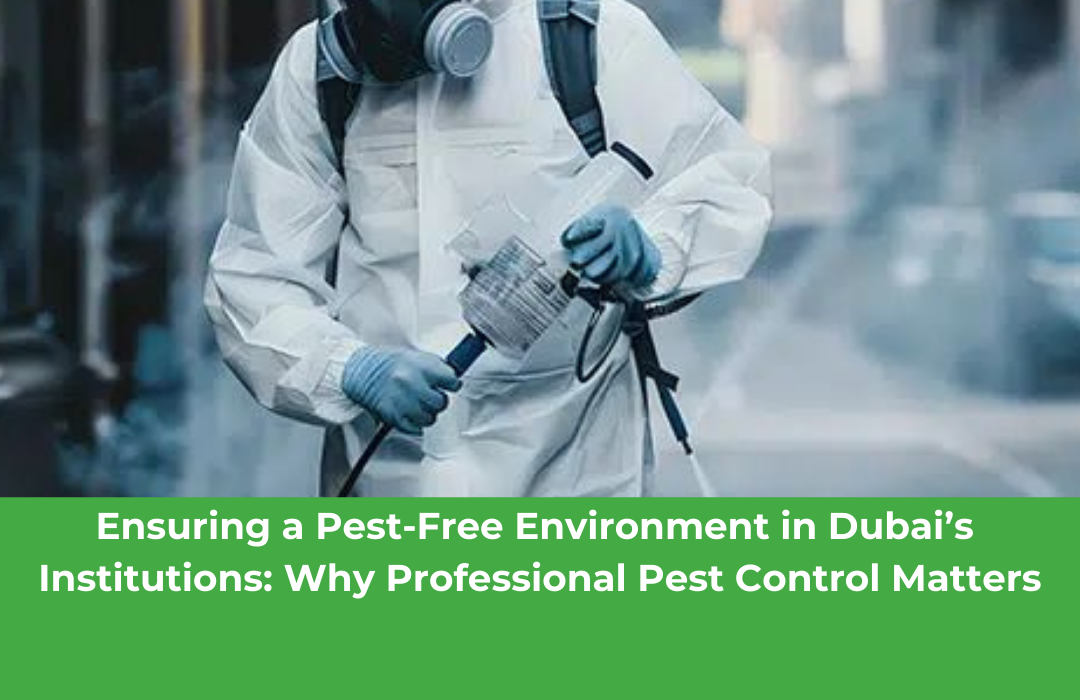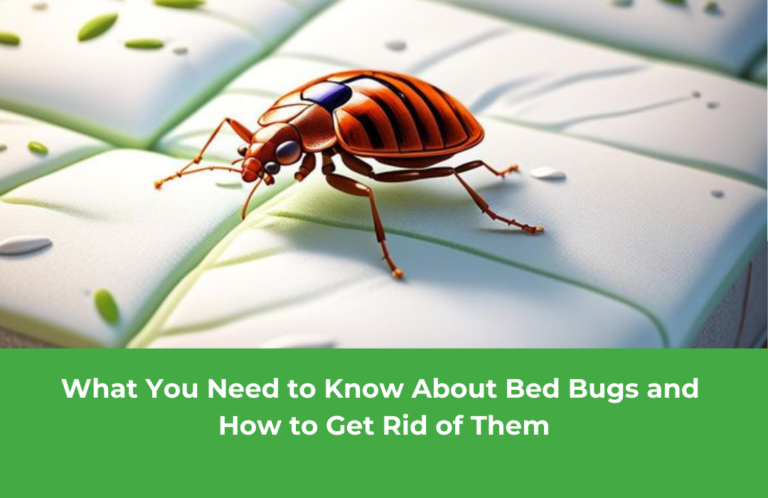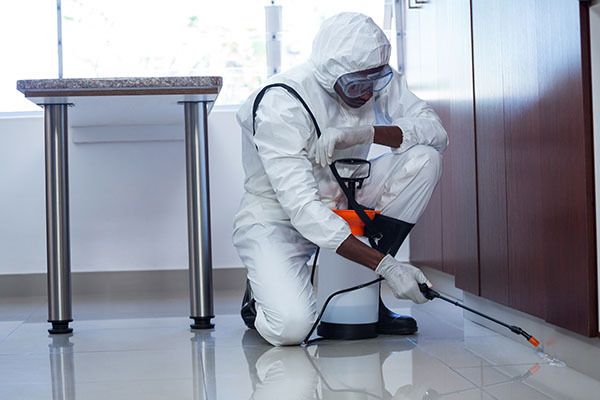Ensuring a Pest-Free Environment in Dubai’s Institutions: Why Professional Pest Control Matters
In Dubai’s thriving institutional landscape, from schools and hospitals to office buildings and government facilities, maintaining a pest-free environment is more than just a cleanliness issue. The hot, humid climate combined with urbanization creates an ideal environment for pests to thrive, making comprehensive pest control services essential for institutional buildings. Whether you’re responsible for a…
In Dubai’s thriving institutional landscape, from schools and hospitals to office buildings and government facilities, maintaining a pest-free environment is more than just a cleanliness issue. The hot, humid climate combined with urbanization creates an ideal environment for pests to thrive, making comprehensive pest control services essential for institutional buildings. Whether you’re responsible for a school, healthcare facility, or corporate office, it’s crucial to invest in professional pest control services to safeguard the health and well-being of employees, students, and visitors.
In this blog, we will explore why pest control is especially important in Dubai’s institutions, the common pest-related challenges, and best practices for preventing infestations.
Why Pest Control Matters for Institutions in Dubai
Dubai is known for its rapid growth and modern infrastructure, but like many growing cities, it also faces challenges related to pests, especially in large institutional buildings. A variety of factors—such as the climate, dense population, and increased construction—can contribute to pest issues in commercial and institutional environments.
For institutions like schools, hospitals, and office complexes, pests can pose serious health risks, create safety hazards, and even affect business or academic operations. Additionally, pest problems can tarnish an institution’s reputation and cause significant financial losses.
Here are some specific reasons why institutional pest control is crucial in Dubai:
- Health and Hygiene Concerns
Dubai’s hot and humid weather conditions make it a breeding ground for pests like rodents, cockroaches, and mosquitoes. These pests carry diseases, and in environments like schools, daycare centers, and hospitals, even a minor infestation can have serious health implications. Schools with children and hospitals with vulnerable patients must be especially vigilant. - Compliance with Local Regulations
In Dubai, the UAE has stringent laws surrounding hygiene and pest management in institutional settings. For instance, schools and food-service areas are required to maintain a pest-free environment to comply with health and safety standards. Failure to meet these regulations can result in fines, business interruptions, or even closure. - Damage to Property
Pests such as termites and rodents can cause significant damage to institutional infrastructure. Rodents chew through wires, insulation, and furniture, while termites can compromise the structural integrity of wooden beams and furniture, leading to costly repairs. - Protecting Reputation and Trust
Whether it’s a school, hospital, or corporate office, the appearance of pests can severely damage an institution’s reputation. Parents, patients, and employees alike are unlikely to trust an environment that has visible signs of pest infestations. Ensuring a pest-free environment is essential for maintaining trust and credibility.
Common Pests in Dubai’s Institutional Buildings
Understanding the types of pests that commonly infest institutional buildings in Dubai is the first step in effective pest control. Some of the most common pests in institutional settings include:
- Rodents (Mice and Rats): Rodents are a common problem in Dubai due to the urban environment and the availability of food sources. They can be particularly dangerous in schools, hospitals, and offices where they may spread diseases or damage property.
- Cockroaches: The warm and humid climate of Dubai provides a perfect habitat for cockroaches. They are known to carry a variety of diseases, including food poisoning and allergies, making them a significant health risk, especially in kitchens, cafeterias, and healthcare facilities.
- Termites: Termites are a serious concern for institutions in Dubai, particularly those with older wooden infrastructure. They can cause extensive damage to building structures, furniture, and library collections.
- Ants: While small, ants can be a nuisance in institutional settings. Some species, such as carpenter ants, can also cause significant damage to the structure of a building.
- Bed Bugs: Bed bugs are another growing issue, especially in institutions like hotels, hospitals, and dormitories. They can cause discomfort, sleeplessness, and skin irritations.
- Flies and Mosquitoes: The combination of warm temperatures and standing water in certain areas of the building can lead to the attraction of flies and mosquitoes, which carry diseases and affect the overall hygiene of an institution.
Best Practices for Institutional Pest Control in Dubai
Given the specific needs and challenges faced by institutions in Dubai, it’s important to implement a tailored pest management strategy. Below are the best practices for preventing and managing pests in institutional buildings:
- Regular Inspections and Monitoring
Institutions in Dubai should work with a professional pest control service to schedule regular inspections of their facilities. Consistent monitoring helps to detect early signs of infestations and prevent pest-related issues before they escalate. - Integrated Pest Management (IPM)
IPM focuses on a holistic, environmentally-friendly approach to pest control. It emphasizes preventing pest problems by managing factors such as sanitation, entry points, and food sources. In Dubai, where pests are highly adaptable, IPM can be a proactive and sustainable approach. - Sanitation and Cleanliness
Dubai’s warm climate makes it critical for institutions to maintain strict cleanliness practices. Ensuring that food waste is disposed of promptly, trash bins are sealed, and areas like kitchens and restrooms are regularly cleaned will deter pests from taking residence in the building. - Sealing Entry Points
Inspect the exterior of your building for cracks, gaps, or holes that pests could use to gain access. Regular maintenance of windows, doors, and vents is essential in keeping pests out, especially rodents and insects. - Waste Management
Proper waste disposal is crucial to prevent attracting pests. In Dubai, institutions should ensure that trash is sealed in containers, emptied regularly, and disposed of in a way that doesn’t allow pests to forage. The exterior waste areas should be clean and well-maintained. - Employee and Staff Awareness
Institutions should train staff to recognize signs of pest activity and encourage them to report any issues promptly. Proper storage of food, clean workstations, and maintaining a pest-free environment are responsibilities that everyone should share. - Professional Pest Control Services
Partnering with a professional pest control service in Dubai ensures that institutions receive the latest and most effective pest control methods. These services can help develop a customized pest management plan that addresses the specific needs of the institution and the types of pests they are most vulnerable to.
Conclusion
Pest control is not just a matter of convenience but a vital element in ensuring the health, safety, and reputation of institutions in Dubai. Whether you’re managing a school, healthcare facility, or corporate building, working with professional pest control experts to implement proactive measures is essential for maintaining a clean and pest-free environment.
By focusing on regular inspections, Integrated Pest Management (IPM), cleanliness, and waste management, institutions can reduce the risk of pest infestations and avoid the significant consequences that come with them. Don’t wait for pests to become a problem—act now to protect your building, staff, and visitors.







